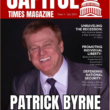The Salt Lake Tribune again provides example of the harm being done to society by shoddy, agenda-ridden journalism.
In November, 2007 The Salt Lake Tribune published two articles by Lisa Schencker and Rebecca Walsh regarding education. Their work (especially Ms. Walsh’s) displayed such astonishing intellectual dishonesty that I, assuming the customary right to respond granted to those who figure prominently in such coverage, wrote a response. With characteristic integrity, The Salt Lake Tribune refused to publish it. Today, however, they published another article by Lisa Schenker which could have been titled, “Oops! We were wrong about everything we were fighting Byrne about.”
I will first provide easily verifiable data regarding
First, the data. The
How does
With such data at hand, let us turn to the Tribune’s work.
Lisa Schencker’s November 18 piece (“
That is, yes,
When it comes to just not getting the joke, however, all honors are due Ms. Rebecca Walsh. She writes: “If Byrne had really put his money where his mouth was – with low-income and minority families frustrated with public schools – he could have paid for thousands of private school scholarships.” If Ms. Walsh were capable of performing that modicum of research one would expect of a sophomore journalism student she would learn that I do, in fact, support precisely such causes, paying for hundreds of scholarships for minority children in Utah as well as building 19 schools educating about 6,000 kids in Africa and Asia (and funded the DC voucher movement, which is now serving thousands of children). Why it is wrong to seek to provide choices for, not hundreds, but hundreds of thousands, Ms. Walsh leaves unaddressed.
Ms. Walsh notes the demands for apology that were spawned by a deceptively-edited statement of mine that appeared on You Tube: she neglects to mention that the demands for apology disappeared as soon as the complete statement was posted. In fact, I received numerous apologies from some who had previously demanded them, again, a fact Ms. Walsh could have discovered had she tried “research.”
Ms. Walsh notes that I feel so let down by our governor that I said I would back an opponent of Huntsman (“even a communist”) while neglecting to note that I also said, “That’s not going to happen. There is not going to be anybody who seriously threatens him… I like the guy, he’s a decent, he’s a lovely intelligent guy, I like him” but I could not support him again myself, given his abdication of what he led me to believe was a core principle.
http://www.kutv.com/content/news/politics/default.aspx?articleID=30196
Most significantly, Ms. Walsh apparently misunderstood my Tribune editorial asserting that Referendum #1 was not an IQ test but a sanity test (following Einstein’s dictum that insanity is doing the same thing over and over while expecting different results, which is what Utah committed itself to do by rejecting Referendum #1). It was not a retraction, it was an escalation. So that Ms. Walsh not waste any more ink on poorly aimed rejoinders, I’ll state it with total clarity: I wish neither to disrespect nor scold my adopted state, but I believe that
Curiously, Ms. Walsh made no discernible attempt to grapple with my arguments. Her one nod in that direction is her statement that I “gussied up [my] argument with statistics comparing
That was the set-up. Here is the punchline. Today, January 9, 2008, The Salt Lake Tribune ran a story whose headline read, Utah’s overall school quality grades put it near bottom nationally. The story accurately describes precisely what Ms. Schenker could have herself ascertained months ago.
What damage is done to society by journalists so supercilious they can rationalize distorting the news as heavily as these folks did in November? Do they simply think that they they can obfuscate the public discourse to steer the polity to decisions about which they, the anointed, know best? What damage did it do when they misled a state that “ranks among the bottom eight states in the nation when it comes to education” (in a nation that ranks near the bottom of industrial countries) into thinking that it was “Top 10 in Math and Science”?
I am given to understand that many Utah got angry at me for my comments about “a statewide IQ/insanity test.” I am indifferent to it, but I do think their anger is misplaced.



